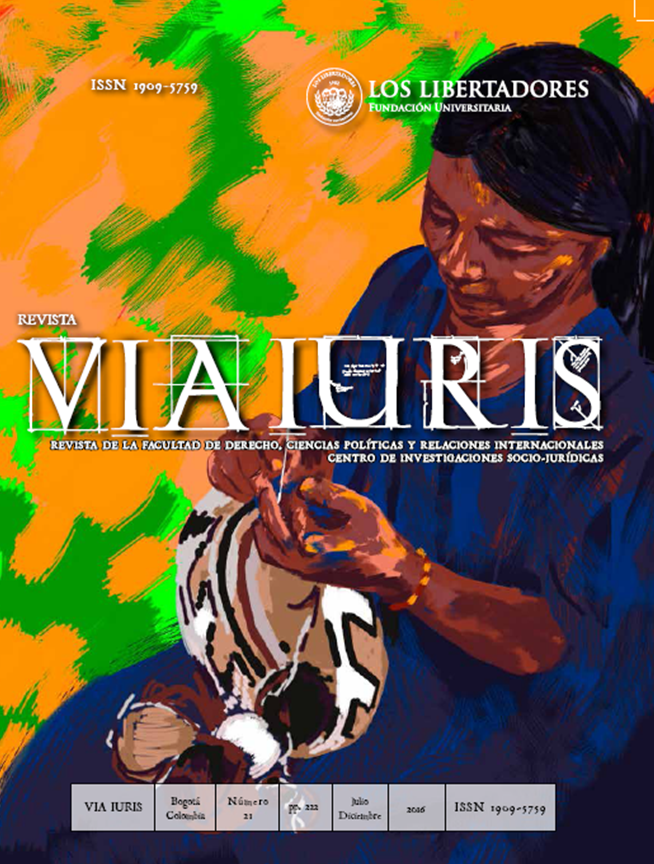Abstract
From the look of a "global" system, serious defects are found in institutions (civil status of persons, education, law enforcement, social environment, etc.), and the manifestations of the social body and individuals (political, economy, culture, morality, art, science, etc.), influenced and permeated by the religious field. So, he was raised as a research problem discussion on what would be the legal phenomena and legal partner in the field of civil law, education system and law enforcement, undermine the institutionalization and development of the secular State in Colombia from 1991 constitution from the perspective of the constitutional criteria of the right to equality, freedom of religion and free development of personality. This in order to identify and characterize the light of constitutional jurisprudence legal phenomena and legal partner last confessional State in Colombia, which remain valid in practice, being contrary to the direction and development of the principles that make up the State lay in Colombia.
Using for this purpose a design of qualitative research, quantitative research themselves (percentages, statistics) tools, inductive inference and diachronic analysis of the data. Shedding resulted in the apparent resistance of various sectors of the former State, which persist to the new regime which stands raising the need to draw practices and strategies that gradually allow the internalization of the judicial and legal imperative established in Colombia since 1991.
References
Camargo, P. (1987). Crítica a la Constitución de 1886. Bogotá: Temis, S.A., 1987.
CO-PADRES. (s.f.). Co-padres.net Recuperado el 27 de noviembre de 2013 de http://www.co-padres.net/familias-homoparentales.php
Corte Constitucional. T-409 de 1992. M.P. José Gregorio Hernández Galindo, Alejandro Martínez Caballero y Fabio Moron Díaz; 8 de junio de 1992).
Corte Constitucional. Sentencia T-403 de 1992. (M.P. Eduardo Cifuentes Muñoz; 3 de junio de 1992).
Corte Constitucional. Sentencia T-393 de 1997. (M.P. José Gregorio Hernández Galindo; 19 de agosto de 1997).
Corte Constitucional. Sala Plena. Sentencia C-478 de 1999. (M.P. Martha Victoria Sáchica de Moncaleano; 7 de julio de 1999)
Corte Constitucional. Sentencia T-332 de 2004. (M.P. Jaime Córdoba Triviño; 15 de abril de 2004).
Corte Constitucional. Sentencia T-493 de 2010 (M.P. Jorge Ignacio Pretelt Chaljub; 16 de junio de 2010).
Corte Constitucional. Sala Plena. Sentencia C-355 de 2006 (M.P. Jaime Araújo Rentería y Clara Inés Vargas Hernández;10 de mayo de 2006).
El Espectador. (17 de 11 de 2013). Avances jurídicos de la comunidad LGBTI.
Grosman, L. (1998). El juramento forzoso. Revista Jurídica, 2.
Guerrero, G. (1999). Educación y Política en el régimen del liberalismo radical. Sur del Estado soberano del Cauca 1863-1880. Nariño: Ceilat.
Herrera, M. (2002). La educación superior en el siglo XX. Recuperado el 20 Noviembre de 2013 de http://www.banrepcultural.org/blaavirtual/revistas/credencial/octubre2002/educacion.htm
Melo, J. (1991). Las reformas liberales de 1936 y 1968. Recuperado el 27 de noviembre de 2013 de http://www.banrepcultural.org/blaavirtual/revistas/credencial/enero1991/enero2.htm
Prieto, V. (2011). Estado laico y libertad religiosa: antecedentes y desarrollos de la Constitución colombiana de 1991. Medellín: Biblioteca Jurídica Diké.
Profamilia. (s.f.). ¿Qué es el aborto. Recuperado el 8 de octubre de 2013 de http://www.profamilia.org.co/aborto/
Trujillo, R. (2003). El episcopado colombiano. Intransigencia y laicidad (1850-2000). Bogotá: ICAHN.
NORMATIVAS
Constitución Política de Colombia. (1886). Bogotá. Imprenta de Echevarría Hermanos. Recuperado el 20 de noviembre de 2013 de http://www.bdigital.unal.edu.co/224/36/constitucion_de_la_republica_1886.pdf
Constitución Política de Colombia. (1991). Bogotá: Legis.
Congreso de la República de Colombia. (3 de marzo de 1993). [Ley 48 de 1993]. D.O. 40.777 de 4 de marzo de 1993.
Congreso de la República de Colombia. (23 de mayo de 1994). [Ley 133 de 1994]. D.O. 41.369, de 26 de mayo de 1994.
Congreso de la República de Colombia. (24 de julio de 2000). [Ley 599 de 2000]. D.O. 44.097 de 24 de julio de 2000.

This work is licensed under a Licencia Creative Commons Atribución-NoComercial-

